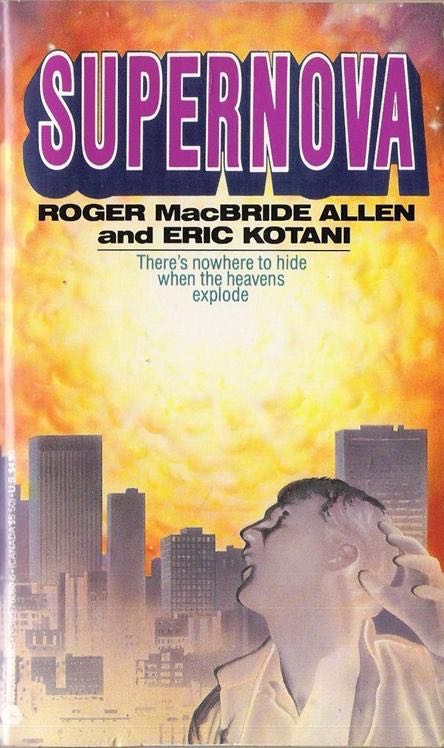Supernova
Reviewed date: 2004 Jul 29
Rating: 3
345 pages
Supernova is thrilling. I stayed up late to read just one more page, just two more pages, and just one more after that, until it was nearly midnight. In the past I've been impressed with Roger MacBride Allen's skill in writing interesting, suspenseful novels, but have not been impressed with his command of science. I'm no astrophysicist, but the scientific holes in The Torch of Honor were so big you could fly an asteroid through them.
That is not the case with Supernova. Allen teamed up with Eric Kotani, a "world-class space scientist who has done research on supernovae, among other cosmic events." Well, that's more like it! A science fiction novel co-written by a professional scientist. It can hardly help but be good.
The basic plot is simple enough for anybody to understand: Sirius B, the companion star of Sirius A (the brightest star in the sky) explodes. Not just a nova, a supernova. But of course, it takes 8.9 years for the light from the explosion to reach Earth. Will young astronomer George Prescott interpret the signs in time to predict the supernova? Even if he does, how will that knowledge help to save the Earth? Mix in some millennial End Times biker cults and you've got yourself an engaging story.
In many ways, Supernova reads like a techno-thriller. You know the sort--the popular trash that Tom Clancy writes so masterfully. But the thrill in Supernova is not based on technology, it is based on pure science. The excitement is in watching scientists work at universities and observatories, uncovering secrets of the universe, not in watching muscled supermen blow each other up with fancy technology. It is not a techno-thriller, it is a science thriller.
Supernova is excellent. My only complaint is that the plot's action peaks about thirty pages from the end of the book. I don't mean to nitpick, but the action that occurs after the peak is anti-climactic compared to the events of the previous 300 pages. Still, Supernova rates a three out of five.
